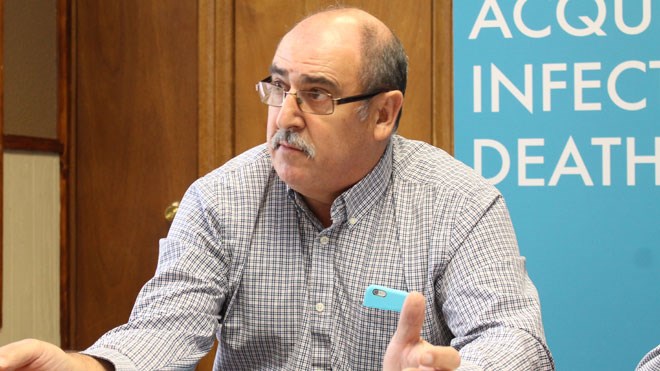Around 3,200 people in Ontario die each year from hospital-acquired infections such as C. Difficile, says the Ontario Council of Hospital Unions.
Members with the hospital division of the Canadian Union of Public Employees (CUPE) are on a 20-city tour across Ontario to present a new report on hospital-acquired deaths and lobby the province for more funding to address the issue.
“Many of these deaths are preventable,” said Louis Rodrigues, the Ontario Council of Hospital Unions' first vice-president.
Rodrigues said the deaths from hospital-acquired infections in Ontario are equivalent to eight jumbo jets going down and killing everyone onboard.
“They would ground those jets,” he said. “But in the health-care sector it seems to be acceptable that these people are dying needlessly.”
Nicholas Black, the council's regional vice-president for Northern Ontario, and a cleaner at the Temiskaming Hospital, said Ontario hospitals need more cleaning staff to ensure infections don't spread among patients and staff.
Hospitals also need to do more regular deep cleans (where everything is thoroughly cleaned) and intensify regular cleaning, he said.
Black said the United Kingdom has taken a proactive approach to reducing its hospital-acquired infection rates by having more cleaners per floor.
That investment, he said, has saved money in the long run and has prevented needless deaths.
The Ontario Council of Hospital Unions has said hospitals in the province are losing 1.8 per cent in funding per year due to frozen budgets and rising costs. Ontario hospitals are 25 per cent underfunded, they say.
In a statement, Health Sciences North said it follows established practices to control the spread of infections.
“We follow established best practices set out by the Provincial Infectious Diseases Advisory Council as they relate to cleaning standards for acute care settings,” the statement said. “High occupancy levels and hospital overcrowding certainly makes our job more difficult and we take all possible precautions to prevent the transmission of infections. Research shows that proper hand hygiene is very effective and we urge everyone to wash their hands to prevent the spread of infection.”
